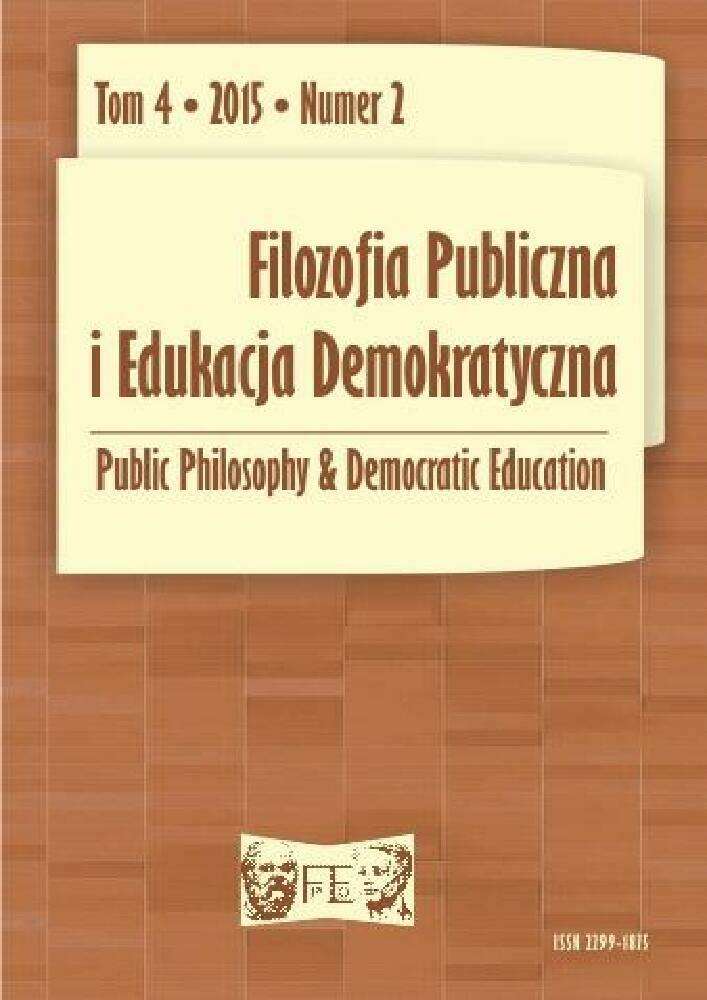Abstrakt
This article offers an authorial idea of curriculum contents integration thanks to implementation of phenomenon-based learning method, philosophy as a school subject, and design thinking. Author believes that teaching contents and school subjects need to be integrated in order to comprehensively discuss modern phenomena in lessons. The manuscript presents briefly each component: Finnish phenomenon-based learning method and its circumstances of implementation, design thinking and an example of its application to education, as well as philosophy as a school subject to teach thinking and as a supplement for phenomenonbased learning method. The article attempts to prove that these components have certain objectives and characteristics in common and they complete one another providing new quality of teaching. This proposal is specifically designed for Polish education system having in consideration its obstacles and opportunities. Nevertheless, this idea might act also as an inspiration for other countries because it is meant to be universal.
Bibliografia
Bleazby Jennifer, Social reconstruction learning. Dualism, Dewey and philosophy in schools, Routledge, New York London 2013.
Brown Tim, Zmiana przez design: jak design zmienia organizacje i pobudza innowacyjność, tłum. Marta Höffner, Instytut Dziennikarstwa i Komunikacji Społecznej Uniwersytet Wrocławski, Wydawnictwo Libron, Wrocław 2013.
Dewey John, Democracy and Education. An Introduction to Philosophy of Education, A Penn State Electronic Classics Publication, The Pennsylvania State University, Bellefort 2001 (1916).
Dewey J., Jak myślimy?, tłum. Zofia Bastgenówna, Państwowe Wydawnictwo Naukowe, Warszawa 1988.
Dewey J., Logic. The Theory of Inquiry, Henry Holt & Company, New York 1938.
Fisher Robert, Uczymy jak myśleć, tłum. Krzysztof Kruszewski, Wydawnictwa Szkolne i Pedagogiczne Spółka Akcyjna, Warszawa 1999
Garner Richard, Finland schools: Subjects scrapped and replaced with ‚topics’ as country reforms its education system, The Independent 2015, http://www.independent.co.uk/news/world/europe/finland-schools-subjects-are-out-and-topics-are-in ascountry-reforms-its-education-system-10123911.html.
Kant Immanuel, O pedagogice, tłum. Dorota Sztobryn, Wydawnictwo Dajas, Łódź 1999.
Laukkanen Reijo, “Finnish Strategy for High-Level Education for All”, [w:] Niels C. Soguel, Pierre Jaccard [eds.], Governance and Performance of Education Systems, Springer, Dordrecht the Netherlands 2008, ss. 305-324.
Lipman, Matthew, Thinking in Education, Cambridge University Press, Cambridge 2003.
Pobojewska, Aldona [red.], FILOZOFIA edukacja interaktywna, metody – środki – scenariusze, STENTOR, Warszawa 2012.
Podstawa Programowa Przedmiotu Filozofia, IV etap edukacyjny, tylko wersja rozszerzona, 2011 Ministerstwo Edukacji Narodowej, https://men.gov.pl/wp-content/uploads/2011/02/4g.pdf.
Podstawa programowa kształcenia ogólnego dla szkół podstawowych, Ministerstwo Edukacji Narodowej 2012, http://www.ceo.org.pl/sites/default/files/news-files/podstawa_programowa_do_ponadgimnazjalnych.pdf.
Podstawa programowa kształcenia ogólnego dla gimnazjów i szkół ponadgimnazjalnych, których ukończenie umożliwia uzyskanie świadectwa dojrzałości po zadanym egzaminie maturalnym, Ministerstwo Edukacji Narodowej 2012, http://www.ceo.org.pl/sites/default/files/news-files/podstawa_programowa_do_ponadgimnazjalnych.pdf.
Roth Bernard, Nawyk Osiągania. Odrzuć myślenie życzeniowe, zacznij działać i przejmij kontrolę nad swoim życiem, tłum. Piotr Cieslak, Galaktyka, Łódź 2015.
Silander Pasi, Phenomenal Eduaction. Re-thinking from Finland, Finland 2015, http://www.phenomenaleducation.info/phenomenon-based-learning.html.
Spychała Jarosław M., „Herakles, Jezus Chrystus i Lord Vader na rozstajnych drogach. O etycznym przesłaniu metody LEGO-LOGOS”, Filozofia Publiczna i Edukacja Demokratyczna, Tom 2 (2013), Nr 1, ss. 48-57.
Spychała Jarosław M., „ΛΕΓΩ-ΛΟΓΟΣ™: czytać, myśleć, mówić”, [w:] Pobojewska Aldona [red.] FILOZOFIA edukacja interaktywna, metody – środki – scenariusze, SENATOR, Warszawa 2012, ss. 217-223.
Spychała Jarosław M., „LEGO-LOGOS: Dlaczego Tales patrzył w niebo?”, Zeszyty Szkolne Edukacja Humanistyczna, Rok VII, nr 3, SENATOR, Warszawa 2007, ss. 24-28.
Strauss Valerie, No, Finland isn’t ditching traditional school subjects. Here’s what’s really happening, Washington Post 2015, https://www.washingtonpost.com/news/answer-sheet/wp/2015/03/26/no-finlands-schools-arent-giving-up-traditional-subjects heres-what-the-reforms-will-really-do/.
Weber Barbara, „Community of inquiry: filozofowanie z dziećmi”, tłum. Ewa Nowak, [w]: Cern Karolina M., Juchacz Piotr W., Nowak Ewa, Edukacja demokratyczna, Uniwersytet im. A. Mickiewicza w Poznaniu Wydawnictwo Naukowe Instytutu Filozofii, Poznań 2009, ss. 77-99.
Zhukov Tatyana, Phenomenon-based learning: What is PBL?, Noodle 2015, https://www.noodle.com/articles/phenomenon-basedlearning-what-is-pbl.
Żmijska Małgosia, Kołowacik Emilia, Żmijski Janusz, Myślenie projektowe (Design thinking) z Klasą, Podręcznik opracowany dla programu Koduj z Klasą, CC by 3.0, Centrum Designu Gdynia, Centrum Edukacji Obywatelskiej, http://www.ceo.org.pl/ sites/default/files/news-files/przewodnik_dt_roboczy_10_druk_small_0.pdf.
Licencja
Prawa autorskie (c) Autorzy zachowują prawa autorskie i prawa do publikacji swoich artykułów w tym czasopiśmie, przyznając czasopismu prawo do ich rozpowszechniania na warunkach CC BY-NC-ND 4.0
